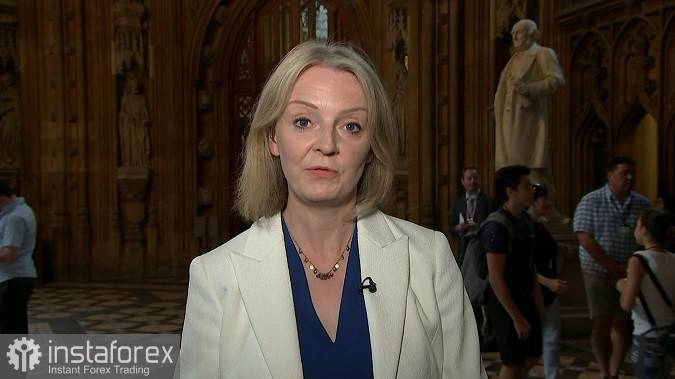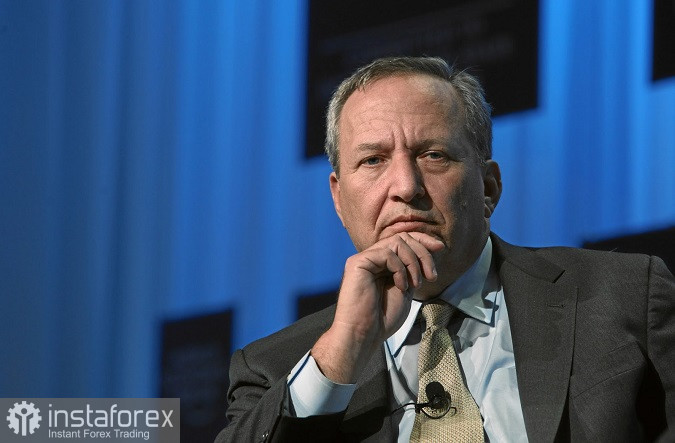
The UK is going through a financial crisis that will last for years and threatens to accelerate the plunge of the economy into recession, and the country's new prime minister is under threat of strong pressure.
In the week since the government announced the largest tax cuts since 1972 with scant information on how they will be financed, the pound has fallen to its lowest ever level against the dollar, the cost of insuring British public debt against the risk of default has soared to its highest since 2016 and the Bank of England was forced to intervene amid concerns about pension funds.
What happens next will determine how deep the impending recession turns out to be. The main question is whether Prime Minister Liz Truss's three-week administration will be able to restore investor confidence.
As the markets fell, the BoE was forced to take measures to prevent the collapse of the gold market, and applied a version of the political tool that Truss has criticized in recent months. She promised to buy everything that would be needed to restore order in the market. This caused a rally in debt bonds, but raises two risks: that the bank will have to raise rates even more within a few weeks, and that investors may be afraid that the BoE is financing the government.
Leading bankers in the City of London called on Finance Minister Kwasi Kwarteng to calm the markets ahead of the planned statement on November 23.
The International Monetary Fund, which came to the aid of the UK in 1976, has already called on the government to reconsider its tax benefits. Prominent economists are lining up to warn that the UK is showing signs of an emerging market. Speaking to the BBC, former BoE governor Mark Carney accused the Truss government of "undermining" the country's economic institutions.
The prime minister on Thursday backed her plans, saying that economies around the world are facing tough pressure.
"I'm quite sure the government did the right thing," she told BBC local radio. "This is the right plan."

"Britain will be remembered for a long time for having conducted the worst macroeconomic policy among all major countries in a long time," said former US Treasury Secretary Lawrence Summers, now a professor at Harvard University and a paid contributor to Bloomberg Television.
A crisis of confidence has been brewing for years. Questionable pronouncements by the ruling Conservatives - from Brexit bailouts to parties on Downing Street during the lockdown - coupled with the recent removal of a top Treasury official and the side effect of the country's fiscal oversight, have led investors to disbelieve the Chancellor when he promised to stabilize public finances.
Nothing illustrates this better than the fall of the pound. It has fallen from a high of more than $2 in 2007, shortly before the financial crisis, to $1.50 at the time of the Brexit referendum, and is now on the verge of parity with the dollar.
Nevertheless, Friday's act of financial generosity - being unsecured - marked a serious breakthrough with the economic traditions of the Conservative Truss Party. The government still needs to determine how it will cover the additional borrowing needed to finance a £45 billion tax cut and an additional £60 billion plus for its program to offset the recent rise in electricity bills.
These measures will lead to an increase in the country's budget deficit to 4.5% of gross domestic product in the medium term. According to Bloomberg Economics, this would be enough to lead to an explosive increase in the debt burden, which will reach 101% of GDP by 2030.
Meanwhile, the BoE will come under increasing pressure. The central bank has spent most of the year trying to raise interest rates fast enough to cope with rising inflation, which it failed to predict.
The BoE is now almost guaranteed to respond to the easing of fiscal policy by tightening monetary policy. Money market traders are now betting on an interest rate hike of at least 150 basis points by the next policy meeting on November 3. If we do not take into account the risk of an emergency increase outside the scheduled meetings, this would be an unprecedented step since the government granted the bank independence in 1997. Prices also show that the base rate will almost certainly reach 6% next year.
Companies and homeowners are now preparing for a sharp increase in the cost of borrowing. Britain's largest firms are already facing record high costs to refinance their debts. The Resolution Foundation estimates that an additional rate hike could add more than £1,000 to the annual cost of a typical £140,000 mortgage, Credit Suisse Group AG estimates that house prices could "easily" fall by as much as 15%.
Thus, the UK faces a bleaker outlook than what Truss promised in her summer campaign to succeed Boris Johnson, when she talked about changing the "usual economic strategy." Her own survival as prime minister is even in question. She faces elections in 2024, and one of the opinion polls this week showed that the leadership of the opposition Labor Party has increased to 17 points, which is the highest figure in the history of YouGov.
It cannot be said that Truss was not warned. During the summer campaign for the post of prime minister, her opponent, former Chancellor Rishi Sunak, called her tax policy a "fairy tale". Economists from Citigroup Inc. even warned that her ideas pose "the greatest risk from an economic point of view" for the UK.
 English
English 
 Русский
Русский Bahasa Indonesia
Bahasa Indonesia Bahasa Malay
Bahasa Malay ไทย
ไทย Español
Español Deutsch
Deutsch Български
Български Français
Français Tiếng Việt
Tiếng Việt 中文
中文 বাংলা
বাংলা हिन्दी
हिन्दी Čeština
Čeština Українська
Українська Română
Română

